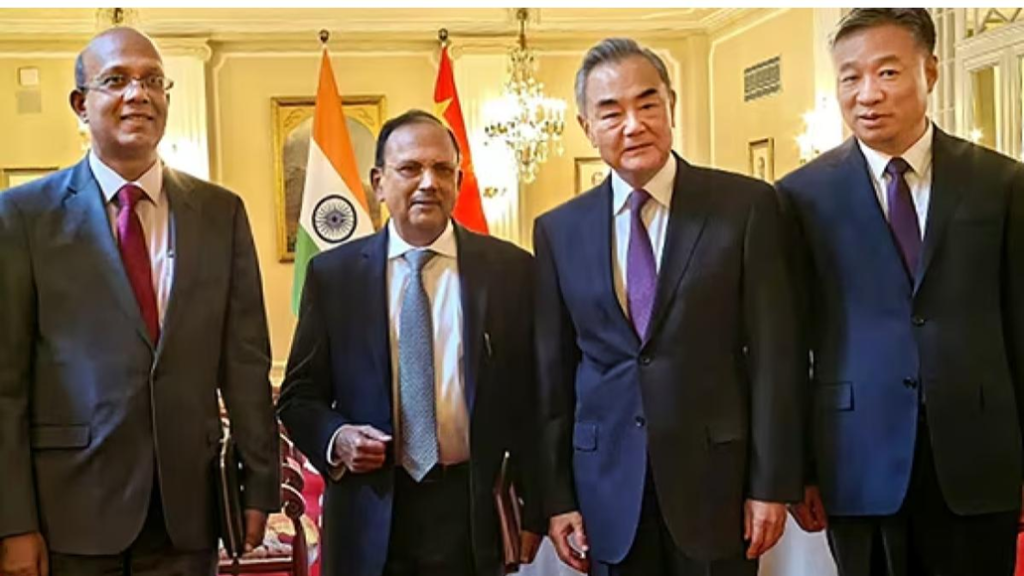External Affairs Minister Dr S Jaishankar arrived in Tianjin, China, for the Shanghai Cooperation Organisation (SCO) foreign ministers’ meeting, marking his first visit to the country since the deadly Galwan clashes in 2020. The visit, alongside Defence Minister Rajnath Singh’s trip in June, is being viewed as the strongest indication yet of a slow but deliberate reset in the turbulent India-China relationship.
Why Jaishankar’s First China Visit Since Galwan Could Be A Turning Point
Why In News
- External Affairs Minister Dr S Jaishankar arrived in Tianjin, China, for the Shanghai Cooperation Organisation (SCO) foreign ministers’ meeting, marking his first visit to the country since the deadly Galwan clashes in 2020. The visit, alongside Defence Minister Rajnath Singh’s trip in June, is being viewed as the strongest indication yet of a slow but deliberate reset in the turbulent India-China relationship.
S Jaishankar In China
- In Jaishankar’s presence in China is significant in itself. It is his first visit to the country in over five years, and comes amid a renewed push by both New Delhi and Beijing to stabilise their relationship.
- The foreign minister met Chinese Vice President Han Zheng on Monday and extended support for China’s presidency of the SCO – a China-led grouping that includes India, Pakistan, Russia and several Central Asian nations.
- During the meeting, Han invoked the metaphor of the “Dragon-Elephant Dance”, indicating a desire to deepen cooperation between the two Asian giants.
- Referring to the 2023 meeting between Chinese President Xi Jinping and Prime Minister Narendra Modi in Kazan, Han described it as a pivotal moment that helped restart and advance China-India ties. He emphasised that as major developing nations and key members of the Global South, China and India must “choose to be partners that support each other’s success”, noting that the “Dragon-Elephant Dance” remains the right path forward.
Kailash Mansarovar Yatra Reopens
- Marking the 75th anniversary of diplomatic relations, Jaishankar highlighted the recent resumption of the Kailash Mansarovar Yatra, a revered pilgrimage route in India that passes through Chinese territory. “The resumption of the Kailash Mansarovar Yatra is widely appreciated in India,” he said, adding that “continued normalisation of our ties can produce mutually beneficial outcomes.”
- Jaishankar acknowledged the complexity of the current international landscape and stressed the importance of open dialogue between India and China, calling it essential for neighbouring nations and major economies. “An open exchange of views and perspectives between India and China is very important,” he told Vice President Han.
India-China Border Clash
- This is Jaishankar’s first visit to China since the Galwan Valley clash in 2020, which marked the worst India-China border incident in over four decades. The deaths of soldiers on both sides pushed ties to their lowest point in recent memory.
- Since then, the revival of dormant diplomatic channels has begun. The decision to restart talks under the Special Representatives (SR) mechanism was reportedly made during the Modi-Xi meeting in Kazan. Jaishankar’s visit follows those of Defence Minister Rajnath Singh and NSA Ajit Doval, who were in China for SCO engagements in June. the first visit by an Indian defence minister to China in over a decade.
- During that trip, Singh met his Chinese counterpart Admiral Dong Jun and outlined a four-pronged approach to stabilize ties, including adherence to the 2024 disengagement pact, accelerated de-escalation, demarcation of borders, and trust-building.
- “Held talks with Admiral Dong Jun, the Defence Minister of China, on the sidelines of SCO Defence Ministers’ Meeting in Qingdao. We had a constructive and forward looking exchange of views on issues pertaining to bilateral relations,” Singh wrote on social media.
Dalai Lama’s Succession Concerns
- As the SCO FM meeting is scheduled to be held, Chinese Embassy spokesperson in India on July 13 called for refrain from comments on Tibet and Dalai Lama’s succession, stating that Tibet related issue is a “thorn” in the bilateral relations of the two countries, which is becoming a “burden” for India.
- Spokesperson Yu Jing took to X (formerly Twitter) to raise alarms around the region’s issues using a Chinese name for it. “In reality, Xizang-related issue is a thorn in China-India relations and has become a burden for India. Playing the “Xizang card” will definitely end up shooting oneself in the foot.”
- “The reincarnation and succession of the Dalai Lama is inherently an internal affair of China, brooking no interference of any external forces,” she said, adding that the Indian government has made political commitments to China by recognising Xizang as an “Autonomous Region” of China and not allowing Tibetans to engage in political activities against China in India.
India Reassessing Strategic Calculus
- Geopolitical experts view India’s outreach as calculated pragmatism amid a shifting global landscape.
- “India thought it would be a very close strategic ally (of the US) but they were not getting the support they were expecting from Washington,”.
- China’s growing influence over multilateral institutions like SCO and BRICS is also pushing India to recalibrate, said Phunchok Stobdan, a former senior Indian diplomat.
- “India sees this as the pragmatic approach. At the same time, it does not want to be seen yielding too much to the Chinese demands for domestic reasons,” he noted.















